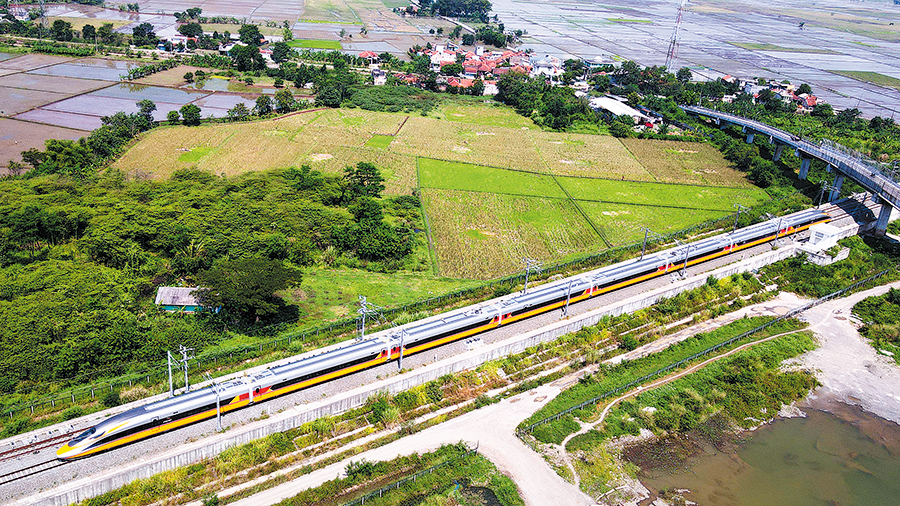
An inspection train runs along the Jakarta-Bandung High-Speed Railway in Bandung, Indonesia, on June 23. XU QIN/XINHUA
Southeast Asian countries will need to accelerate their transition to clean energy to limit their dependence on imported fuel and rein in inflationary pressures, analysts said.
Geopolitical tensions such as the Ukraine crisis and the Middle East crisis have disrupted the supply of fossil fuels and caused a spike in prices in the past few months. This has raised consumer prices among net oil and gas importers like the member states of the Association of Southeast Asian Nations. ASEAN imports at least 50 percent of its crude oil requirements from the Middle East.
Putra Adhiguna, the Jakarta-based managing director of the independent think tank Energy Shift Institute, said the geopolitical tensions that are rattling oil prices are "just another reminder" for ASEAN to speed up its shift to renewable energy.
The World Bank said if the conflict in the Middle East were to escalate, benchmark Brent crude oil prices could rise to more than $100 per barrel. Brent crude futures are trading this week at more than $80 per barrel.
"In recent months, we have geopolitical concerns which are potentially impacting upon oil markets," said David Broadstock, a senior research fellow and energy transition research lead with the Sustainable and Green Finance Institute at the National University of Singapore. This is why ASEAN "just fundamentally needs to move away" from its dependence on fossil fuel, said Broadstock.
He said regional cooperation initiatives, such as the Singapore-Indonesia solar power export deal, are also crucial in financing the shift to renewables. By partnering with each other, Broadstock said ASEAN economies can unlock investment opportunities which may not be possible if done individually.
Rachmat Kaimuddin, Indonesia's deputy coordinating minister of marine affairs and investments in infrastructure and transportation, said the Indonesian government has recently given conditional approval to five local companies to export solar power to Singapore.
Fabby Tumiwa, executive director of the Institute for Essential Services Reform think tank in Jakarta, said solar power exports will not only bring in revenues but also help Indonesia reduce its reliance on coal power and fulfill its climate commitments.
"For Indonesia, there is no choice other than decarbonizing," Tumiwa said. He said the local demand for solar power is increasing and that Indonesia can potentially export solar power to other ASEAN countries as well.
Apart from Indonesia, Singapore is also planning to import low-carbon energy from Cambodia and Vietnam. The city-state is currently importing hydropower from Laos via Malaysia and Thailand.
Singapore mainly relies on imported renewable energy as its limited land space prevents it from generating its own clean energy and meeting its goal of achieving net zero emissions by 2050.
According to Adhiguna of Energy Shift Institute, Singapore can promote regional cooperation in renewable energy because it has the financial resources to import clean energy and it is one of the few countries in Asia that has "priced" carbon emissions by imposing a carbon tax.
Other ASEAN countries are also boosting their renewable energy capacity to fulfill their commitment to the UN climate pact.
Leonardus Jegho in Jakarta contributed to this story.